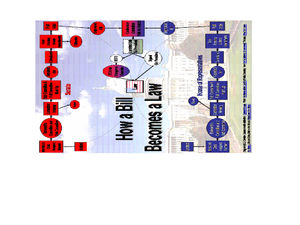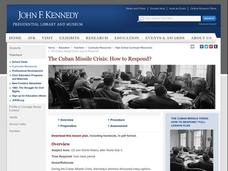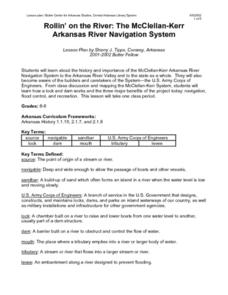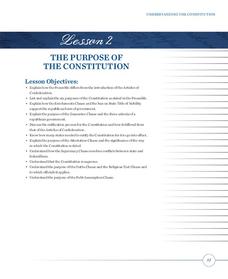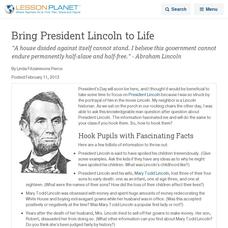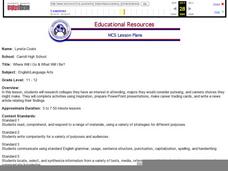Curated OER
How Government Works and the Rights of the People
Eighth graders identify how to be responsible citizens. In this civics lesson, 8th graders review websites of congressional members and then create questionnaires about the responsibilities of citizens.
Curated OER
US & Iroquois Constitution Parallels
Students engage in a lesson that is concerned with the concepts related to comparing the United States and Iroquois Indians while focusing upon the foundations of the ruling documents like the US Constitution. They conduct research using...
Curated OER
Understanding The Preamble
Students explore the Preamble of the U.S. Constitution. In this government instructional activity, students write a preamble to encourage cooperation in their classroom as they study the Preamble of the U.S. Constitution.
Curated OER
Globalization101.org Lesson Plan on Prescription Drug Prices
Students examine the issue of prescription drug prices in the United States. They research the issue and participate in a mock US Senate hearing on the subject.
Curated OER
Lesson Plan: The Car Chase Scence
Students investigate how to be informed when buying a car. In this research skills lesson, students use the Federal Citizen Information Center Website to find information they need to complete an activity featuring all of the costs of...
Curated OER
Causes of WWI-Introductory Lesson
Sixth graders identify the causes of World War I. In this World War I history lesson, 6th graders view a Powerpoint to develop background knowledge about World War I. Students make a picture map of the events that led to war and describe...
Curated OER
A Proper Role for Government - Seeking Perfection in an Imperfect World
Students discuss the proper role of government in the economy. Reviewing the foundations for a market economy to work properly, they decide how to best direct resources to get the most out of them. They distinguish between private and...
Curated OER
Japanese-American Relocation
Consider the causes and effects that led to the internment and relocation of Japanese Americans during WWII. Learners read the story "Baseball Saved Us" and selected chapters from Farewell to Manzanar. Then, they view a slide-show, and...
School Improvement in Maryland
Affirmative Action
Do the government's affirmative action policies promote equity in the United States? The Fourteenth Amendment to the US Constitution and affirmative action policies come under scrutiny in an activity that asks class members to...
School Improvement in Maryland
Smart Growth
New roads, new businesses, new developments, new mass transit systems. All growth has both positive and negative effects on communities. Government classes investigate the principles of Maryland's 1997 Smart Growth program and the...
Curated OER
The Virginia Plan and the New Jersey Plan: Student Worksheet
These guided reading questions accompany several websites on the development of the US Constitution. While some of the links have changed, they are still accessible. History or government classes benefit from reading primary source...
School Improvement in Maryland
Demographic Investigation
What are the factors that influence voting patterns? How do these factors influence government funding? Is participation the squeaky wheel gets the grease? Class members interpret graphs and analyze trends to determine what demographic...
School Improvement in Maryland
Analysis of Marbury v. Madison
Should the United States Supreme Court have the power of judicial review? Instructors guide class members through a review of Marbury v. Madison and assist class members in writing a brief of the case. As independent practice,...
John F. Kennedy Presidential Library & Museum
The Cuban Missile Crisis: How to Respond?
For 13 days, the United States stood on the edge of nuclear War. The Soviet Arms buildup in Cuba is the focus of an activity that asks groups to analyze how the governmental role each of John F. Kennedy's advisors played went on to...
PBS
What Are the Primaries and Caucuses?
What are the essential differences between primaries and caucuses? As part of a study of the process by which Americans select their candidates for US president, class members examine the nominating process, the changes that have...
Curated OER
Rollin' on the River: The McClellan-Kerr Arkansas River Navigation System
Middle schoolers take a close look at the McClellan-Kerr Arkansas River Navigation system. They study how the Army Corps of Engineers built and monitor the system. Learners discover how a lock and a dam work, and study three benefits of...
Heritage Foundation
The Purpose of the Constitution
What does the Constitution have to do with my life? This is a question teachers hear on a day-to-day basis. Teach high schoolers just how relevant the US Constitution is to them today with essays, real-life connection activities, and more.
Curated OER
Development of American Political Parties: The Two-Party System
Was American politics always bound to the two-party system? Learn how the two-party system developed, why third parties tend not to do so well, and all the various political parties that have emerged throughout US history. Each party is...
Curated OER
Bring President Lincoln to Life
"A house divided against itself cannot stand. I believe this government cannot endure permanently half-slave and half-free." - Abraham Lincoln
Curated OER
What are the Rules?
Get young learners involved in the development of classroom rules! Students and the teacher discuss the purpose of having rules, including how rules provide order, security and safety. Then learners design pictures to accompany the...
Curated OER
The Causes and Course of the First World War
Use this twelve-day lesson plan to teach about the causes and courses of WWI. Each day scholars attend lectures, complete creative activities, and hold round table discussions on what they've learned. Web links and resources are...
Curated OER
Target Earth
Space scientists use water displacement to determine the mass of a cubic centimeter mini meteorite, and then use it as a small-scale representative of an asteroid. They figure out the orbital velocity of an asteroid. Then they use a...
National Endowment for the Humanities
Albert Sabin and Bioethics: Testing at the Chillicothe Federal Reformatory
Do the ends justify the means? Getting a drug approved in the US is a long and involved process. But at some point out, it involves testing on humans. The ethics of such testing is the focus of a resource that uses Dr. Albert Sabin's...
Curated OER
Where Will I Go and What Will I Be?
Help your future college graduates prepare for higher education with this series of lessons. High schoolers complete research projects about the colleges they would like to attend, and create PowerPoint presentations about their careers...


